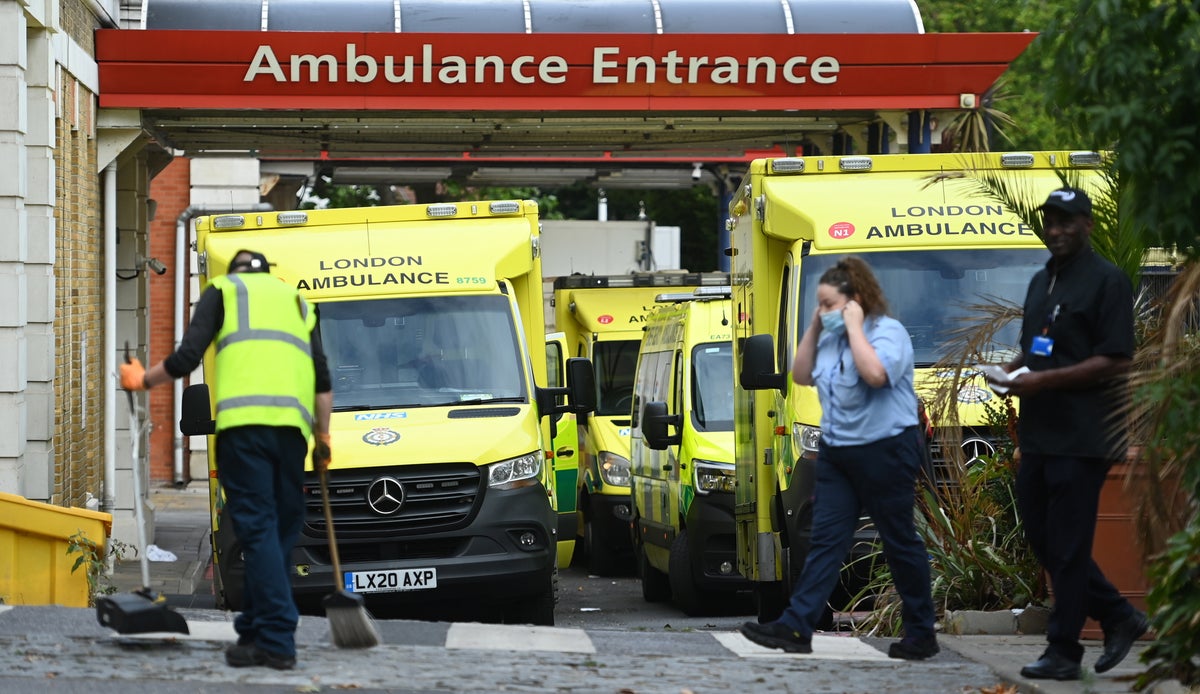
NHS hospitals with the longest waiting times for patients in the back of ambulances have been told they have a month to stop all delays, The Independent has learnt.
An internal briefing by NHS leaders in the Midlands, seen by The Independent, reveals 10 hospitals have been put on a “priority” list nationally and must “eliminate” all “ambulance handover delays” by 30 September
It comes as data revealed last week that 152,000 ambulance hours had been lost due to crews waiting to hand off patients to hospitals.
The briefing reveals five of the NHS trusts identified are in the Midlands: University Hospitals of Leicester, University Hospitals Birmingham, University Hospitals North Midlands, Worcestershire Acute and Shrewsbury and Telford Hospital Trust.
The hospitals were told they must also stop “blind handovers”, which means holding patients outside in ambulances rather than inside hospitals.
The news comes amid an ongoing crisis within ambulance services after reports last week revealed one patient waited 40 hours for an ambulance and another 87-year-old man waited 15 hours on the floor in the rain.
Ambulance response delays are being driven by long waits for crews outside of busy A&Es. NHS leaders have previously warned delays in discharging patients from beds are causing delays, which impacts the ability of ambulances to hand over patients to hospitals.
Last week the Association of Ambulance Chief Executives said 4,000 patients were likely to have experienced harm due to response and handover delays.
Revealing its winter plan, NHS England also said last week: “Much of the pressure on urgent and emergency care is driven by the current, significant, growing strain in social care. Too many patients are spending longer in hospital than they need to, creating pressure along the entire pathway.”
On Monday, The Independent reported fire services have resorted to taking ill patients to hospital amid rocketing call-outs to medical emergencies.
According to the Health Service Journal, NHS trusts were called by health minister Steve Barcley and warned about their handover delays. These include three of the trusts mentioned in the NHS England briefing.
Letters obtained by The Independent under the Freedom of Information Act reveal one ambulance provider, West Midlands Ambulance Service (WMAS), has been warning NHS leaders over ambulance handover delays since at least 2015.
One letter in 2015, to a local hospital leader, said: “The biggest risk is to patients who need a 999 ambulance which is delayed because the ambulance is stuck at hospital.”
In 2016 a similar letter from NHS England warned the same thing to hospitals across the Midlands.
A letter from 2017 to Worcestshire Acute Hospital said: “I am concerned that we are becoming spectators and commentators to a rapidly deteriorating position. To clarify this, you may be aware that WMAS have been concerned about delays in patient handovers at WAHT for many years, and the situation was particularly bad three years ago.”
In May 2021 WMAS wrote to University Hospital Birmingham and warned: “Patients are now being put at serious risk of harm on a daily basis due to these delays which are out of proportion to the rest of the West Midlands hospitals.”
“Despite everything that we have done, and the hard work of many, the situation with delays in patient handovers has become progressively worse, arguably in a way that began to worsen pre-Covid, and has worsened dramatically in the last few months.
“In addition, we have a new concern that has arisen during Covid, and this involves patients being refused entry to hospitals and being kept on the back of ambulances, often for protracted lengths of time.”
An NHS spokesperson said: “We are committed to ensuring patients receive care when they need it and are working with ambulance services and their partners on the actions they are taking to prevent handover delays and support systems to reduce them.
“The NHS continues to face significant pressures - responding to record category 1 ambulance call-outs in July, alongside continued pressures in community and social care with only 40 per cent of patients able to be discharged when they are ready, making it harder to admit patients from A&E. It however remains vital that anyone needing emergency care dials 999, and the public use 111 online and local pharmacies for other health issues and advice.”







